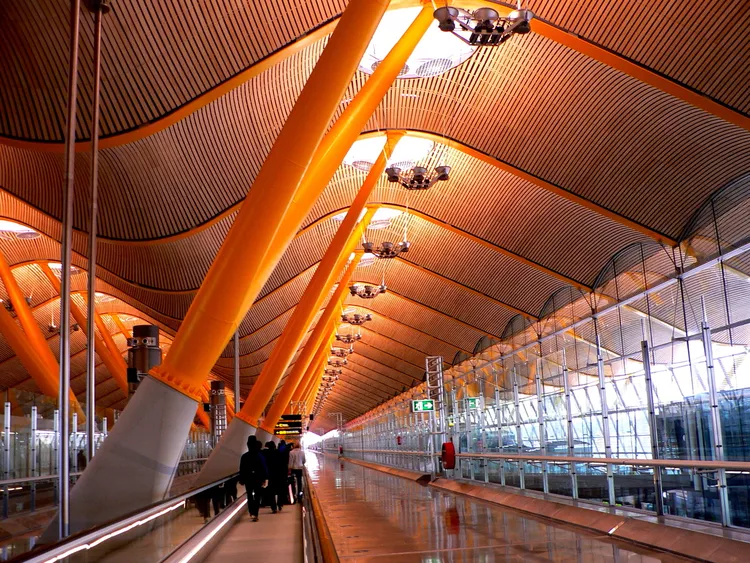1. Overview of Madrid Airport
2. Essential Information
3. Navigating the Airport
4. Transportation Options
5. Dining and Shopping
6. Airport Amenities
7. Important Tips
All You Need to Know About Madrid-Barajas International Airport
Madrid-Barajas International Airport serves over 50 million passengers annually, making it Spain’s busiest national and international travel hub. With four passenger terminals serviced by numerous airlines, this modern facility stands as the principal gateway connecting Spain with the global community.
Its extensive layout can appear overwhelming, particularly for first-time travelers. This guide will meticulously outline the essential information, ensuring your journey is seamless—allowing you to focus more on enjoying your time in Spain.
Essential Information: Airport Code, Location, and Contact
- Airport Code: MAD
- Location: Situated in the suburb of Barajas, approximately nine kilometers (about five miles) from central Madrid.
- Website
- Departures and Arrivals info
- Map
- Contact: (+34) 91 321 10 00
Navigating the Airport: Know Before You Go
While large and bustling, Madrid Airport is usually efficient and navigable. Comprising four passenger terminals, T3 is currently not in use (as of June 2019). Terminals T1, T2, and T3 share one building, while T4 and its satellite terminal T4S are distinct. A complimentary shuttle bus, operating every five minutes during the day, connects the main terminals.
- Terminal T1
- Departures: First floor
- Arrivals: Ground floor
- Airlines
- Terminal T2
- Departures: Second floor
- Arrivals: Ground floor
- Airlines
- Terminal T4
- Departures: Second floor
- Arrivals: Ground floor
- Airlines
- Terminal T4S: Flights here require check-in at the main T4 building, with access to T4S solely via the Automatic People Mover (APM).
Transportation Options: Getting Around Madrid Airport
For those without a vehicle, efficient public transportation makes accessing and departing from the airport straightforward.
- Airport Express Bus: Provides travel to Madrid’s Atocha train station via Plaza de Cibeles; duration: approximately 30-40 minutes. Tickets cost 5 euros, payable on the bus.
- Cercanías (Commuter Train): Line C1 connects Atocha and Terminal T4 in under 30 minutes. Ticket prices are €2.60 for a single journey and €5.20 for a round trip.
- Metro: Line 8 links the airport to Nuevos Ministerios station. Metro tickets start around €1.50-2 euros, plus a €3 airport supplement.
- Taxis: Clearly marked taxi stands outside all terminals provide access to official taxis, recognizable by their white body with a red stripe.
Dining and Shopping: Refreshments and Retail Therapy
Madrid Airport features a variety of dining options catering to diverse preferences and budgets. Here are notable spots:
- La Bellota: Savor the flavors of Spanish acorn-fed Iberian cured ham at this sophisticated eatery. (Terminal T4)
- Kirei by Kabuki: An upscale fusion restaurant offering fresh sushi and Mediterranean fare. (Terminal T1)
- MasQMenos: Experience a lively atmosphere complemented by a fantastic selection of Spanish wines. (Terminal T4)
- Farine: Offers a delightful mix of French pastries and Spanish dishes in a cozy café setting. (Terminal T2)
- Mahou Sports Bar: Ideal for enjoying tapas and sporting events on large screens. (Terminal T2)
Airport Amenities: Convenience and Comfort
Six lounges are available across the terminals, including T4S. Access rules apply, requiring a boarding pass for that terminal.
Currently, online lounge booking isn’t available; however, day-of passes can be obtained at lounge receptions, subject to space availability.
Wifi & Charging Stations: Stay Connected
Free wifi is accessible via the network “AIRPORT FREE WIFI AENA,” though the speed may vary. Many airport cafes, such as Starbucks, provide better connectivity.
Charging stations are located in Terminal T4, while outlets for devices can be found throughout the airport, including in restaurants.
Important Tips & Facts: Enhance Your Travel Experience
- Madrid Airport, the first in Spain, ranks as the second-largest in Europe, following Paris’s Charles de Gaulle Airport.
- Terminal T4 significantly increased capacity upon its 2006 opening, featuring a distinctive design crafted by architect Antonio Lamela.
- The Air Rooms in Terminal T4 provide clean spaces available for up to six hours during the day for relaxation or showers.





